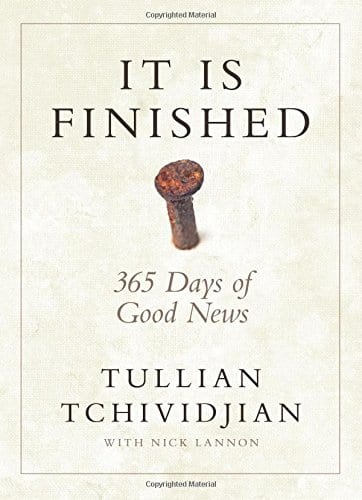 Every year around this time, millions of people begin to contemplate what their New Year’s resolutions will be. However, according to Tullian Tchividjian, senior pastor of Coral Ridge Presbyterian Church in Fort Lauderdale and the grandson of Evangelist Billy Graham,.people should think twice before making one.
Every year around this time, millions of people begin to contemplate what their New Year’s resolutions will be. However, according to Tullian Tchividjian, senior pastor of Coral Ridge Presbyterian Church in Fort Lauderdale and the grandson of Evangelist Billy Graham,.people should think twice before making one.
In his upcoming book, It Is Finished: 365 Days of Good News, Tchividjian’s message is that while we have good intentions of fixing ourselves when we make New Year’s resolutions, not only do we all wind up falling short when we break them, but we shouldn’t associate our worth and value to a resolution in the first place. The good news of God’s grace is that God loves us as we are, not as we should be — that God loves imperfect people because imperfect people are all that there are.
Written in the style of a devotional, the 365 daily readings in It Is Finished are based on pop culture headlines and other stories in the news, examples of Tchividjian’s own life and personal relationships and excerpts from the author’s sermons and blog posts.
Inherent in these stories is a message of the human need for grace and the perils of “performancism,” a term coined by Tchividjian that describes how we have embraced a mindset that equates our identify and value directly with our performance and accomplishments, such as the money we earn, how intelligent we are and what other people think of us.
“The message of It is Finished is that God’s love for us, approval of us and commitment to us does not ride on our resolve but on Jesus’ resolve for us,” said Tchividjian.
The following is a passage excerpted from the forthcoming devotional.
We Are Weak, But He Is Strong
The world tells us in a thousand different ways that the bigger we become, the freer we will be. The richer, the more beautiful, and the more powerful we grow, the more security, liberty and happiness we will experience. And yet, the gospel tells us just the opposite: the smaller we become, the freer we will be.
This may sound at first like bad news, but it’s actually the best news.
In the Bible, slavery is equated with self-reliance, self dependence — the burden of depending on yourself and controlling your circumstances to ensure meaning and security, safety and significance. But as we know, the burden of self-determination is enormous. When your meaning, your significance, your security, your protection, your safety are all riding on you, it actually feels like slavery. Life is harder and heavier when the things we crave the most depend on our “making it happen.” When we equate our value with some attribute or ability (what others think of us, how much is in our bank account, our relative stature in our community) so that without that attribute or ability we cease to matter, life is harder, not easier. We become weary and heavy laden.
This is a burden we were never meant to bear, and yet after the Fall in Genesis 3, self-reliance became our default mode of operation. You might even call it our inheritance. In our exile from Eden, we naturally tend toward self-salvation.
Thankfully, God does not leave us there. The gospel is for the defeated, not the dominant. In view of God’s holiness, we are all losers (Rom. 3:23). We are all sufferers and sinners. The distinction between winners and losers is irrelevant when none of us can claim victory. The only people who lack desperation are the ones who don’t know themselves very well.
Instead, the gospel is for those who have realized that they can’t carry the weight of the world on their shoulders. Only when God drives us to the end of ourselves do we begin to feel our heavy chains falling off. When we can finally admit that we’re not as strong and good and capable and faithful as we like to think we are, we begin to experience the rest that Jesus offers–the freedom that paid so dearly to secure for broken people like you and me.
The bad news is that you and I are way, way, way weaker than we think we are. The good news is that Jesus is way, way, way stronger than we could ever hope for or imagine — and he came to set us free.
Tullian Tchividjian is a South Florida native, senior pastor of Coral Ridge Presbyterian Church, a visiting professor at Knox Reformed Theological Seminary, and grandson of Billy and Ruth Graham. He is the founder of LIBERATE (liberatenet.org), a bestselling author, a contributing editor to Leadership Journal and a popular conference speaker. Follow Tullian on twitter at: @pastortullian

Comments